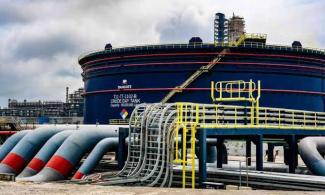Revolution in fuel supply : Dangote Refinery bypasses NNPC to sell petrol directly to Marketers
"Revolution in Fuel Supply: Dangote Refinery Bypasses NNPC to Sell Petrol Directly to Marketers!"
Yakubu Haruna Yakubu
In a groundbreaking development for Nigeria's fuel supply landscape, the Dangote Petroleum Refinery has commenced direct sales of Premium Motor Spirit (PMS), commonly known as petrol, to oil marketers, effectively sidestepping the Nigerian National Petroleum Company Limited (NNPC). This bold move is poised to transform the dynamics of fuel distribution in the country as marketers scramble to secure supplies from the newly operational facility.
Following reports that major oil marketers are ramping up efforts to purchase petrol directly from the Lekki-based refinery, the shift marks a significant departure from previous practices where NNPC acted as the sole off-taker. While some marketers continue to rely on imported petrol, with hundreds of millions of litres set to arrive on Nigeria’s shores in the coming weeks, the emergence of Dangote's direct sales is already altering the competitive landscape.
Just last week, at least four vessels carrying imported PMS docked at Nigerian seaports, according to exclusive reports from The TrafficNg, with approximately 123.4 million litres already berthed. This influx of imported petrol, however, appears insufficient to meet the growing demand, paving the way for the Dangote refinery to take center stage in the nation's fuel supply chain.
Sources close to the refinery confirm that oil marketers can now approach the facility for direct transactions on a willing-buyer, willing-seller basis. A senior official stated, "Marketers are already coming to the refinery to lift PMS. They are lifting directly from the refinery, not through a third party." This new arrangement indicates that the refinery is open for business, and it’s a game-changer for marketers seeking to streamline their supply lines.
While details on pricing remain closely guarded, insiders suggest that the appeal of direct purchasing hinges on favorable market rates. "We have reached agreements with some marketers, and more are still ongoing. If the price is not good, the marketers would not be coming to us," explained an official familiar with the transactions.
The refinery is currently focusing on producing petrol from 53 percent of its crude oil supply, a strategy that could be adjusted based on changing demand for other finished products in the future. This production level signals the refinery's commitment to addressing Nigeria's petrol needs, amid a backdrop of fluctuating global oil prices and a competitive local market.
The announcement has garnered both support and skepticism. While some industry stakeholders are optimistic about the implications of this shift, others question whether the Dangote refinery can sustain this level of production without compromising its contractual obligations with the NNPC. A source previously indicated that the NNPC had been designated as the exclusive off-taker as of September 15, raising eyebrows over the recent changes.
However, Minister of Finance Wale Edun reassured operators that the market had been fully deregulated, allowing marketers to pursue direct purchases from local refineries. "Moving forward, petroleum product marketers are now able to purchase PMS directly from local refineries without the intermediary role of NNPC," he stated, emphasizing the benefits of fostering competition and enhancing market efficiency.
Recently, the Independent Petroleum Marketers Association of Nigeria (IPMAN) has also expressed interest in establishing ties with the Dangote refinery. Vice President Hammed Fashola led a delegation to meet with Dangote Industries’ Vice President Devakumar Edwin, aiming to facilitate smoother operations between IPMAN and the refinery.
Fashola remarked, “We had a fruitful discussion with the group. We have started discussing modalities and other logistics. IPMAN has agreed to work with Dangote. We hope very soon we will start lifting products from the facility.” However, the association maintains that immediate off-take is contingent upon the refinery terminating its existing contract with the NNPC.
As the situation unfolds, it remains to be seen how these new dynamics will reshape the Nigerian fuel market. With the Dangote refinery stepping into a pivotal role, the future of petrol supply in Nigeria is likely to experience significant shifts, promising enhanced efficiency and potentially lower prices for consumers. The refinery's bold initiative may indeed usher in a new era in Nigeria’s fuel sector, challenging traditional distribution practices and paving the way for greater competition.





















